Prime Minister of Satavia
| Prime Minister of the Satavian Federation | |
|---|---|
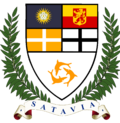 Coat of Arms of Satavia | |
 Flag of the Prime Minister of Satavia | |
| Style | the Right Honourable |
| Reports to | The President and the House of Representatives |
| Residence | The Residence, Port Hope Kingsleigh Castle |
| Appointer | President of Satavia So long as the Prime Minister commands a majority in the House of Representatives, or they have succeded a predecessor without an election |
| Term length | None On the condition that an election is held at least every four years |
| Inaugural holder | Richard Somerset, Viscount Neeves |
| Formation | October 1, 1816 |
| Deputy | Deputy Prime Minister |
| Salary | €350,000 |
| Website | www |
The Prime Minister of Satavia is the head of government of Satavia. The Prime Minister acts as head of the executive and the legislature, as per the Northabbey Model inherited from Estmere.
The post of Prime Minister was first held by Richard Somerset in 1816 after the Federation of Satavia, which saw the seven Satavian Colonies unite to become the Dominion of Satavia. Until the late 19th century, the Prime Minister was almost always a member of the upper house, the House of Peers, which included both commoners and peers, whereas the Prime Minister is now always a member of the lower house, the House of Representatives. The position of Prime Minister has existed continuously since 1816 and was the most powerful position in government through all four iterations of its existence. From 1816 until 1936, the Prime Minister was the head of government whilst the Governor-General was the King's Representative in Satavia and acted as head of state. From 1936 until 1939, as the Union of Satavia, the Prime Minister was both head of government and state, before once again reverting to its position of solely head of government in 1939. The role of the President is mostly ceremonial, making the role of the Prime Minister the most powerful in Satavia.
The longest serving Satavian Prime Minister was Johan van Vallier, Viscount Camburton who served for 24 years and 107 days, whilst the shortest serving elected Prime Minister was Jack Darling who served for 230 days, whilst the shortest serving appointed Prime Minister was Henry Parkinson who served for 70 days. The shortest serving caretaker Prime Minister was Keith Bernstein, who served for 27 days.
List
Dominion of Satavia (1816-1936)
Asterianer Nasionale Conservative Country Dominionist Liberal National Union United
| No. | Portrait | Name (Birth–Death) Constituency |
Term of office | Elected (Parliament) |
Political party | Government | ||
|---|---|---|---|---|---|---|---|---|
| Took office | Left office | Time in office | ||||||
| 1 | 
|
Richard Somerset Viscount Neeves (1756-1838) Peer in the House of Peers |
1 October 1816 | 26 January 1823 | 6 years, 117 days (Served 12 years, 275 days across two terms) |
1816 (1st) | Country | Somerset I |
| from Estmere (nerd) | ||||||||
| 2 | 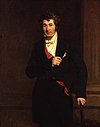
|
Pieter Dandre (1769-1833) Commoner in the House of Peers |
26 January 1823 | 15 December 1824 | 1 year, 324 days | 1823 (2nd) | Asterianer Nasionale | Dandre I |
| pretends to be satavian, actually born in and kinda from nuvania (shock, horror) | ||||||||
| (1) | 
|
Richard Somerset Viscount Neeves (1756-1838) Peer in the House of Peers |
15 December 1824 | 22 May 1831 | 6 years, 158 days (Served 12 years, 275 days across two terms) |
1824 (3rd) | Country | Somerset II |
| TBD | ||||||||
| 3 | 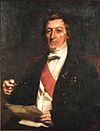
|
Patrick Conway (1779-1834) Commoner in the House of Peers |
22 May 1831 | 16 July 1834 | 3 years, 55 days | 1831 (4th) | United | Conway I |
| TBD | ||||||||
| 4 | 
|
Sir William McCrory Earl of Hodson (1782-1868) Peer in the House of Peers |
16 July 1834 | 22 August 1842 | 8 years, 37 days | 1838 (5th) | United | McCrory I |
| TBD | ||||||||
| 5 | 
|
Sir Lachlan Dachery (1790-1860) Commoner in the House of Peers |
22 August 1842 | 15 January 1845 | 2 years, 146 days | — | United | Dachery I |
| TBD | ||||||||
| 6 | 
|
Sir Thomas Macquarie (1786-1858) Commoner in the House of Peers |
15 January 1845 | 29 October 1848 | 3 years, 288 days | 1845 (6th) | Country | Macquarie I |
| TBD | ||||||||
| 7 | 
|
Daniël Pienaar (1795-1856) Commoner in the House of Peers |
29 October 1848 | 7 May 1855 | 6 years, 190 days | 1852 (7th) | Country | Pienaar I |
| first actually really satavian pm (i.e puts shrimp on the barbie, really hates natives, hennish) | ||||||||
| 8 | 
|
Johan van Vallier Viscount Camburton (1812-1904) Peer in the House of Peers |
7 May 1855 | 22 August 1879 | 24 years, 107 days | 1855 (8th) 1859 (9th) 1863 (9th) 1867 (10th) 1871 (11th) 1875 (12th) |
Dominionist | van Vallier I-II-III-IV-V-VI |
| TBD killed natives that kinda thing | ||||||||
| 9 | 
|
Henry Portlemouth (1834-1895) Commoner in the House of Peers |
22 August 1879 | 11 January 1881 | 1 year, 142 days | 1879 (13th) | Dominionist | Portlemouth I |
| TBD | ||||||||
| 10 | 
|
Jack Darling (1829-1881) Commoner in the House of Peers |
11 January 1881 | 29 August 1881 | 230 days | 1881 (14th) | United | Darling I |
| TBD | ||||||||
| 11 | 
|
Willem Pienaar (1823-1901) Commoner in the House of Peers |
29 August 1881 | 22 August 1883 | 1 year, 358 days | — | United | Pienaar I |
| TBD killed like a ton more natives | ||||||||
| 11 | 
|
Admiral Sir Arthur O'Connell (1846-1944) MP for the Division of Grange, Hope Province |
22 August 1883 | 13 January 1901 | 17 years, 144 days | 1883 (15th) 1887 (16th) 1891 (17th) 1895 (17th) 1899 (18th) |
Conservative | O'Connell I-II-III-IV-V |
| TBD pretty cool bloke probably killed a few natives along the way ofc | ||||||||
| 12 | 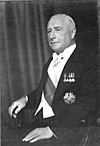
|
Henry King-Stewart Earl of Westenquay (1839-1932) Peer in the House of Peers |
13 January 1901 | 22 August 1903 | 2 years, 221 days | — | Conservative | King-Stewart I |
| TBD | ||||||||
| 13 | 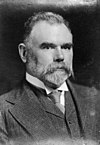
|
Liam Barrett (1861-1955) MP for the Division of Daniels, Western Free State |
22 August 1903 | 18 March 1906 | 2 years, 208 days | 1903 (19th) | United | Barrett I |
| TBD | ||||||||
| 14 | 
|
Harry Goldmann (1849-1921) MP for the Division of McKay, Hope Province |
18 March 1906 | 15 November 1906 | 242 days | March 1906 (20th) | Country | Goldmann I |
| TBD | ||||||||
| 15 | 
|
Lewis Kruger (1853-1925) MP for the Division of Killkairny, Hope Province |
15 November 1906 | 28 December 1909 | 3 years, 43 days | November 1906 (21st) | National Union | Kruger I |
| TBD | ||||||||
| 16 | 
|
Jacobus Pienaar (1856-1949) MP for the Division of Longwood, Hope Province |
28 December 1909 | 22 August 1915 | 5 years, 237 days | 1909 (22nd) 1913 (23rd) |
Liberal | Pienaar I-II |
| TBD | ||||||||
| 17 | 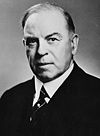
|
Sir Sydney Warwick (1866-1951) MP for the Division of Holt, Orange Province |
22 August 1915 | 22 August 1927 | 12 years | 1915 (24th) 1919 (25th) 1923 (26th) |
United | Warwick I-II-III |
| TBD bit of a chad and he didn't kill the natives so that's nice bcos there are none left to kill :( | ||||||||
| 18 | 
|
Edward Limes (1890-1941) MP for the Division of Court, Hope Province |
22 August 1927 | 23 September 1936 | 9 years, 32 days (Served 11 years, 175 days across two terms) |
1927 (27th) (Great War) 1935 (28th) |
Liberal | Edward Limes I-II-III |
| another gigachad just pretty ill most of the time | ||||||||
Union of Satavia (1936-1939)
| No. | Portrait | Name (Birth–Death) Constituency |
Term of office | Elected (Parliament) |
Political party | Government | ||
|---|---|---|---|---|---|---|---|---|
| Took office | Left office | Time in office | ||||||
| (18) | 
|
Edward Limes (1890-1941) MP for the Division of Court, Hope Province |
23 September 1936 | 13 February 1939 | 2 years, 143 days (Served 11 years, 175 days across two terms) |
1936 (29th) | Liberal | Limes IV |
| gigachad gets deposed :( | ||||||||
Republic of Satavia (1939-1976)
- Parties
National Party Nasionale Hervorming
| No. | Portrait | Name (Birth–Death) Constituency |
Term of office | Elected (Parliament) |
Political party | Government | ||
|---|---|---|---|---|---|---|---|---|
| Took office | Left office | Time in office | ||||||
| 19 | 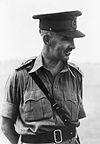
|
Field Marshal Oscar Harrision (1893-1941) — |
13 February 1939 | 28 April 1941 | 2 years, 74 days | — | National | Harrison |
| Harrison lead the February Coup against Edward Limes' government in 1939, and thereafter began the process of dismantling democracy in Satavia. Harrison was assassinated by members of the pro-democracy SRA in April 1941. | ||||||||
| 20 | 
|
Lieutenant General Vincent le Roux (1893-1952) — |
28 April 1941 | 23 December 1941 | 239 days | — | National | Le Roux |
| A childhood friend of Oscar Harrison, Le Roux was serving as his deputy when he was assassinated. Le Roux during his short stint as Prime Minister crushed descent from within the party and external sources, isolating Satavia from many of its traditional allies, including Estmere, who having previously vetoed motions at the CNSC to impose sanctions upon Satavia relented in November 1941. Le Roux was overthrown by his staunch rival Christiaan Pienaar in December 1941. | ||||||||
| 21 | 
|
General Christiaan Pienaar (1899-1972) — |
23 December 1941 | 17 June 1949 | 7 years, 176 days | — | National | Pienaar |
| Pienaar overthrew Vincent le Roux in December 1941 during an emergency cabinet meeting. Pienaar moved swiftly to crush dissenting voices and launched brutal crackdowns on the opposition and opposing viewpoints. The only significant attempt to end National Party rule, the Admiral's Rebellion, was crushed with force by Pienaar who after this diverted huge funds into the army, which in 1946 led to the creation of a federal Coast Guard, within the Army. Pienaar resigned in 1949, selecting Daniël Wilson, the former Governor of the Hope Province, as his replacement. | ||||||||
| 22 | 
|
Daniël Wilson (1904-2001) MP for Division of Grange Lake, Hope Province |
17 June 1949 | 3 March 1961 | 11 years, 259 days | — | National | Wilson |
| Daniël Wilson replaced Christiaan Pienaar when he stepped down in 1949. Wilson had served as Governor of the Hope Province in the years prior to his ascendency to the position of Prime Minister. During his tenure, Wilson further restricted civil liberties and authorised the violent suppression of the 1955 Satavian protests, which was condemned internationally. Wilson's term saw Satavia largely isolate itself from international affairs, becoming a pariah state whilst only maintaining positive relations with Rizealand and Nuvania, united in their determination to fight councils in the Asterias. He stepped down in 1961, and was the longest-serving, and only civilian leader, of the Republic of Satavia. | ||||||||
| 23 | 
|
Air Chief Marshal Danny Vermaak (1917-1961) — |
3 March 1961 | 12 November 1961 | 254 days | — | National | Vermaak |
| Air Chief Marshal Danny Vermaak had been groomed as Daniël Wilson's successor and was an incredibly talented orator. His premiership, however, was cut short after he suffered a fatal heart attack aged 44, although speculation surrounding his cause of death remains. | ||||||||
| 24 | 
|
General Jacobus du Plessis (1907-1969) — |
12 November 1961 | 9 November 1967 | 5 years, 362 days | — | National | Du Plessis |
| Jacobus du Plessis lead Satavia during a period of turbulence characterised by brutal uses of military force and the implementation of limited segregation based on race that targeted, above all, indigenous Satavians as well as, a lesser extent, black Satavians. Du Plessis, a member of the extreme right of the National Party, caused deep divisions within the party that many historians attribute to its ultimate downfall, particularly with the creation of the Nasionale Hervorming, a faction of the National Party comprised of "moderate" National Party members that wished to continue National Party rule through reforms as opposed to violent methods and restrictions on civil liberties. | ||||||||
| 25 | 
|
Air Vice Marshal Paul Wilemse (1923-2008) — |
9 November 1967 | 14 May 1970 | 2 years, 186 days | — | National | Wilemse |
| Air Vice Marshal Paul Wilemse was chosen as the successor to the ailing Jacobus du Plessis and was also a member of the party's extreme right. His premiership was marked by mass infighting between moderates, and extremists as well as the Air Force and Army - the two main branches of the military that propped up the National Party. Ultimately, in order to end the divisions between the two factions of the National Party, Wilemse stepped down in favour of the elderly Satavian Army commander, Dens Maartens, who was regarded by both sides as a middle-ground compromise candidate. | ||||||||
| 26 | 
|
Lieutenant General Denis Maartens (1894-1972) — |
14 May 1970 | 1 October 1972 | 2 years, 140 days | — | National | Maartens |
| Maartens, born in 1894 and a companion of Oscar Harrison, had served in every National Party cabinet, except for the cabinet of Danny Vermack. Maartens term as Prime Minister saw Satavia stabilise and also brokered an uneasy ceasefire between the two main factions of the National Party. However, with his health failing, Maartens was removed from office by Hendrik Botha's Nasionale Hervorming faction. Maartens would die four days later. | ||||||||
| 27 | 
|
General Hendrik Botha (1933-2023) — |
1 October 1972 | 27 September 1976 | 3 years, 362 days | — | Nasionale Hervorming | Botha |
| Botha seized power against the backdrop of Denis Maartens' failing health and took the opportunity to purge the National Party of many of its extremists. He introduced reforms that repealed many of Jacobus du Plessis racially based discrimination laws whilst also increasing personal freedoms. Soon, Botha was faced with huge protests calling for the removal of the National Party from power entirely in 1973; these protests continued for three years and became increasingly violent. Furthermore, many within the Army, both on the extreme far right and those wishing for total reform turned on Botha. Ultimately, with laws against protests relaxed, huge demonstrations were staged in the capital, Port Hope, and across the country. Realising the threat of a revolution, Botha ordered the Hope Province Provincial Guard to crush the demonstrators in Port Hope; the Provincial Guard disobeyed his orders, and led by Johannes Klopper (and backed by the Satavian admiralty) they entered the city, staging a coup d'état that would remove Botha from power. | ||||||||
Satavian Federation (1976-present)
- Parties
Conservative & Country Liberal
| No. | Portrait | Name (Birth–Death) Constituency |
Term of office | Elected (Parliament) |
Political party | Government | ||
|---|---|---|---|---|---|---|---|---|
| Took office | Left office | Time in office | ||||||
| 28 | 
|
Lieutenant Colonel Johannes Klopper (1930-2009) — |
27 September 1976 | 29 November 1976 | 63 days | — | — | Klopper |
| Klopper overthrew the National Party dictatorship during the 1976 Satavian coup d'état, installing himself as temporary Prime Minister. Despite fears that Klopper would refuse to relinquish power, just two months after the coup he handed power over to Eric Edwards, Satavia's first democratically elected Prime Minister since 1936. | ||||||||
| 29 | 
|
Eric Edwards (1935-2017) MP for Division of Baxter, Hope Province |
29 November 1976 | 4 June 1984 | 7 years, 188 days | 1976 (30th) 1980 (31st) |
Liberal | Edwards I–II |
| First elected Prime Minister of Satavia since 1936. Edwards lead the campaign to defeat right-wing reactionary forces during the Satavian Crisis, and pursued closer ties with Rizealand, the NVO and the Euclean Community. Edwards won a supermajority in the 1980 federal election. | ||||||||
| 30 | 
|
Leander Kokkinakis (1951-) MP for Division of St George, Western Freestate |
4 June 1984 | 3 April 1987 | 2 years, 272 days | 1984 (32nd) | Liberal | Kokkinakis |
| Leander Kokkinakis became Satavia's youngest elected Prime Minister as well as the first Satavian Prime Minister of Piraean descent when he was elected with a supermajority in the 1984 federal election. Kokkinakis introduced a number of public welfare reforms, in addition to a system of food stamps popularly known as Kokkinakis Coupons, which remain in use across Satavia. Kokkinakis was forced to resign after the Hope Post published revelations of an affair Kokkinakis was having with a younger man. Despite the criminal status of homosexuality, Kokkinakis was never charged by police but the affair ended his political career. | ||||||||
| 31 | 
|
Maximilian Dumfries (1939-1996) MP for Division of Katter, Hope Province |
5 April 1987 | 1 December 1987 | 212 days | — | Liberal | Dumfries |
| Dumfries was elected Prime Minister by parliamentary members of the Liberal Party after a two-day period of indecision between the left-wing and centrist elements of the party. Dumrfries - a member of the extreme left of the party - soon moved to ensure stability within the party, by threatening to expel members of the centrist factions. Many MPs and Senators of the Liberal Party crossed the floor to join the Conservatives, SDP, United or became independents. Dumfries was forced to call for a general election, in wich both houses (Senate and Representatives) are dismissed, held in December 1987, which saw a resounding defeat for the Liberal party. | ||||||||
| 32 | 
|
Ben de Villiers (1946-) MP for Division of Johnson, Hope Province |
1 December 1987 | 24 June 1994 | 6 years, 205 days | 1987 (33rd) 1990 (34th) |
Conservative & Country | De Villiers I-II |
| De Villiers was elected in a landslide as a result of the unpopularity of the Liberal party. De Villiers was the first Conservative Prime Minister since 1903 and the first Country Party Prime Minister since 1906. De Villiers launched massive spending cuts as well as a huge privatisation programme that saw several state owned enterprises, most notably Satavian Airlines, sold off or publicly floated. De Villiers called an early election in 1990, looking to capitalise off the continued instability and unpopularity of the Liberal opposition. Ultimately, De Villiers' popularity would wane as cost of living increased, and proposals made by the De Villers government to cut federal benefits saw him lose the 1994 federal election to the Liberal party. | ||||||||
| 33 | 
|
John Barrett (1958-) MP for Division of McCray, Hope Province |
24 June 1994 | 7 September 1996 | 2 years, 75 days | 1994 (35th) | Liberal | Barrett |
| Barrett won his electoral campaign prosper by promising huge government handouts in the wake of the ongoing Satavian cost of living crisis that disproportionately affected minorities living in Satavia. Barrett also campaigned for increased provisions of universal healthcare and fought a long and costly legal battle with the governments of the Orange Province, Western Freestate and New Borland, that argued that healthcare provisions were within the remit of the provincial governments and not the federal government. Barrett ultimately failed to deliver on his promise after the Supreme Court ruled in favour of the provincial governments, and was forced into making an embarrassing public u-turn that ultimately lost him the support of the Conservative-controlled Senate. Barrett called on the President to dismiss parliament for a general election, but his request was controversially refused by Damian de Jager, who instead called for a federal election that did not dismiss the Senate. | ||||||||
| 34 | 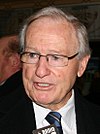
|
Rian de Klerk (1939-) MP for Division of Williams, Western Freestate |
7 September 1996 | 16 August 1998 | 1 year, 343 days | 1996 (36th) | Conservative & Country | De Klerk-Pieterson |
| Elected without a majority, De Klerk was forced to enter into a fractious coalition with the United Party's E. K. Pieterson. This coalition government proved deeply unpopular as policy clashes stunted De Klerk's agenda. The coalition's unpopularity was demonstrated by the loss of the presidency and overall control of the Senate in the 1997 senate elections. With the coaltion now unable to pass legislation through the Senate, De Klerk was forced to ask newly elected President Donald Pienaar to call for a double election. | ||||||||
| 35 | 
|
Milo Malan (1959-) MP for Division of Clarke, Pioneerstaat |
16 August 1998 | 21 July 2001 | 2 years, 339 days | 1998 (37th) | Liberal | Malan |
| Malan was elected in the narrowest margin in Satavian electoral history in a fiercely contested election against incumbent Prime Minister Rian de Klerk. Despite allegations of electoral irregularities, Malan declined to launch an inquiry into the claims. Malan's premiership was tainted by persistent rumours and speculation which were outed after an investigation by the Hope Post in July 2001. Malan resigned on the seventh and was arrested by the Satavian Federal Police the following day. In 2004, he was found guily of massive electoral fraud (including ballot stuffing in several key marginal constituencies) and sentenced to nine years imprisonment. | ||||||||
| 36 | 
|
Andries Kuiper (1960-) MP for Division of Kayle, Orange Province |
21 July 2001 | 14 October 2001 | 85 days | — | Liberal | Kuiper |
| After Malan's resignation, Kuiper was appointed Prime Minister as his replacement. Kuiper was not named as guilty of electoral fraud by the Hope Post and the SFP declined to investigate Kuiper. Nonetheless, Kuiper was forced to call a federal election later that year, which saw the Liberals suffer their worst electoral defeat since Satavia's return to democracy in 1976. | ||||||||
| 37 | 
|
Edward Norton (1961-) MP for Division of Johnson, Hope Province |
14 October 2001 | 27 June 2012 | 10 years, 257 days | 2001 (38th) 2005 (39th) 2009 (40th) |
Conservative & Country | Norton I-II-III |
| Norton was elected with a landslide majority in the 2001 federal election, and perused conservative policies in his first term. However, as campaigning began for the 2005 election, Satavia was struck by the 2005 financial crash, crippling Satavia's economy. Nonetheless, the Government's rapid response saved Satavia from the worst effects being felt elsewhere internationally, and Norton remained personally popular - achieving a double majority in the 2005 election. Norton would win re-election again in 2009, based primarily upon his social and fiscally conservative policies. Norton resigned and retired from politics in 2012 after a car accident killed his wife and two young daughters, at the height of his popularity. | ||||||||
| 38 | 
|
Jago Elliot (1973-) MP for Division of Cape Devon, Hope Province |
27 June 2012 | 9 February 2017 | 4 years, 227 days | 2013 (41st) | Conservative & Country | Elliot I-II |
| Having previously served as Treasurer under the Norton government, Elliot took victory in the Conservative & Country Party leadership election of 2012 unopposed after Norton endorsed him. His re-election in 2013 saw a strong majority for the Conservative party. Elliot was percieved as a continuation of the Norton government and his policies closely mimicked those of Edward Norton, leading to the popularly-coined ideology of "Nortonism". In early 2017, Elliot faced an unexpected leadership challenge from within his party, lead by right-wing Deputy Prime Minister Ella Van Schalkwyk. Elliot lost the leadership election by one vote and resigned as Prime Minister. | ||||||||
| 39 | 
|
Ella van Schalkwyk (1968-) MP for Division of Marais, Orange Province |
9 February 2017 | 4 December 2017 | 298 days | — | Conservative & Country | Van Schalkwyk |
| Previously serving as Deputy Prime Minister, Ella van Schalkwyk, a member of the right wing of the Conservative & Country party, commenced a leadership election that saw her defeat incumbent Prime Minister, Jago Elliot. She became Satavia's first female Prime Minister. Elliot's removal, although supported by the parliamentary Conservative & Country party, was deeply unpopular with the public and press. Huge negative publicity tarnished her electoral campaign and she was defeated by the Liberals, ending over fifteen years of Conservative & Country party electoral dominance. | ||||||||
| 40 | 
|
Jan McKinley (1965-) MP for Division of Cornell, Hope Province |
4 December 2017 | 22 August 2020 | 2 years, 262 days | 2017 (42nd) | Liberal | McKinley |
| Jan McKinley was elected in 2017 primarily due to public discontent at the removal of Jago Elliot by the Conservative & Country party. McKinley, ideologically part of the centrist faction within the Liberal Party, fought off constant opposition from within his party, surviving a record seven leadership challenges in six months. When many of the left broke away from the Liberal Party and crossed the floor to join the minor Labour & Social Democrats, McKinley was forced to call for a general election as the Liberals had lost their majority in both houses. Ultimately, McKinley would lead his party to a wipeout in the 2020 election. | ||||||||
| 41 | 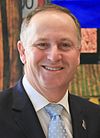
|
Arthur Warwick (1966-) MP for Division of Johnson, Hope Province |
22 August 2020 | Incumbent | 4 years, 134 days | 2020 (41st) 2022 (42nd) |
Conservative & Country | Warwick I-II |
| Warwick won a landslide election in the 2020 federal election. He perused a hardline policy on socialist states particularly Chistovodia and took a harsh stance on Chistovodia during the Arucian Sea Crisis. Continued conservative Nortonian fiscal policies but enacted a more liberal social policy. Introduced an ammendment to the Satavia Act which moved to make the Central Territory and National Capital District constitutionally and legally equal to the other provinces of Satavia. After a legal challenge to the proposed amendments, Warwick called a double election, held concurrently with a referendum, which confirmed support for the ammendment. He won re-election in the 2022 general election, but lost his majority in the Senate forcing him to enter a coalition with the United Party and appoint PK Lawson his deputy, and enter into a confidence-and-supply agreement with Satavia First. | ||||||||
